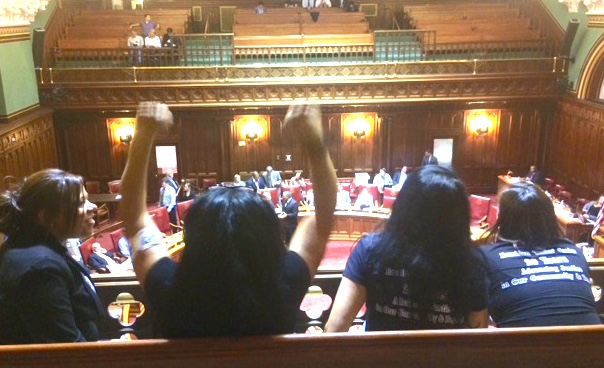
Across the United States, women are organizing for domestic workers’ rights and power. According to the National Domestic Workers’ Alliance, in the next week, the Illinois Domestic Workers Bill of Rights will hit the Illinois State Senate; the Connecticut Domestic Workers’ Bill will go to the Connecticut House of Representatives; and the Oregon Domestic Workers’ Bill of Rights will arrive on the floor of the Oregon State House of Representatives. From sea to shining sea, domestic workers – maids, nannies, and home health care providers – are on the move and winning previously thought impossible battles. Women, overwhelming women of color and largely immigrant women, are transforming a subterranean network into an Overground Railroad of emancipation and enfranchisement. Connecticut, Illinois, and Oregon are stations on that system.
In so doing, women are re-writing history. While every labor victory rewrites history, these particular struggles involve not only State and Civil, or uncivil, Society disrespect and marginalization. They involve the words and texts of law. In Connecticut, for example, domestic workers’ struggle for dignity, rights, power, and better working conditions is aimed at re-writing the State definition of “employer.” Under Connecticut law, “employee” is defined as “any person employed by an employer but shall not include any individual employed by such individual’s parents, spouse or child; or in the domestic service of any person.” The Domestic Workers’ Bill of Rights eliminates the last clause: “or in the domestic service of any person.”
On Friday night, the Connecticut Senate passed the Domestic Workers’ Bill of Rights. Domestic workers – such as Natalicia Tracy, Iame Manucci, Maria Lima and Nina Siqueira – danced and shouted from the gallery, as the final vote was tallied. But they understand that this is the next step. Not only must the House of Representatives pass the Bill, but domestic workers must then militate further to be included in the State’s minimum wage law. That protection is not guaranteed under the Bill of Rights.
In Illinois and Oregon, it’s the same. Domestic workers are pushing to do much more thatn “come out of the shadows.” They have never been “shadow workers”. They have always been women workers on the move, and now the move has risen and expanded to the next stage.
The exclusion of domestic workers from labor law emerges from the explicitly racist foundations of slavery and Jim Crow. Domestic workers writing and promulgating Domestic Worker Bills of Rights participate in an ongoing Black and Brown Workers’ Liberation Movement. Within and beyond #BlackWomensLivesMatter and #SayHerName, domestic workers are pushing and expanding the terrain of emancipatory struggle. A luta continua! The struggle continues!
(Photo credit: Mark Pazniokas / Connecticut Mirror)